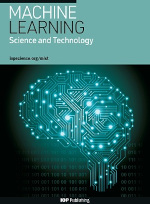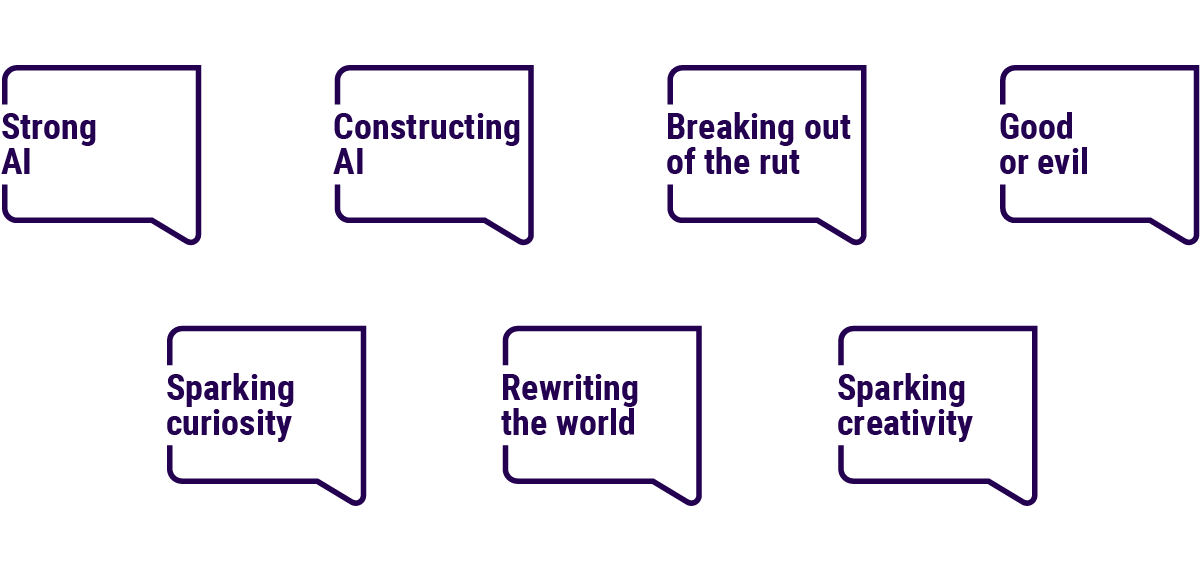Podcast
The CERN Sparks! Podcast - Series 1 - Future Intelligence
Can artificial intelligence be curious? Can it be creative? Can we create it to be ethical and push past the limits that exist today to imagine a world made better with AI in it? At CERN, machine learning already plays a pivotal role in the quest for advancing human knowledge through particle physics – from detector design to data acquisition and analysis. But can AI one day take over the role of scientists? Join hosts Abha and Mark on the Sparks! podcast as they journey through a series of conversations with leading minds shaping the realm of Future Intelligence.
1st edition public event speakers
Series 1 guests
Partners
Sparks! is an Education & Outreach activity funded by the CERN & Society Foundation, and supported by individual donors, foundations and companies. The first edition of Sparks! is made possible thanks to the generous donations of:
Title Partner

Rolex, an integrated and independent Swiss watch manufacture headquartered in Geneva, is recognized the world over for its expertise and the quality of its products. Its watches, renowned for their precision, performance and reliability, are symbols of excellence.
Founded in 1905 by Hans Wilsdorf, the brand pioneered the development of the wristwatch and is at the origin of numerous major watchmaking innovations such as the waterproof Oyster case, launched in 1926, and the Perpetual rotor self-winding mechanism, invented in 1931.
Perpetual is a philosophy that embodies Rolex's vision and values as a company. The brand is actively involved in supporting the arts and culture, sport and exploration, as well as those devising solutions to preserve the planet through its Perpetual Planet initiative.
Science and innovation also play an important role at Rolex, whose history was first linked with CERN’s more than 60 years ago. More recently, Rolex has partnered with CERN for TEDxCERN, the Universe of Particles exhibition, and now the Sparks! Serendipity Forum.
Academic partner
Frontiers for Young Minds is a free, online open-access journal for kids, publishing high-quality, clear science to inform and inspire the next generation of scientists and engaged citizens.
In our unique process, every article is written by top academic authors and peer reviewed by our young global audience aged 8-15, to ensure everything we publish is not only understandable but engaging for their peers.
Free to read and re-use for anyone with access to the internet, our 1000+ original articles have achieved 28 million views and downloads worldwide. Recognized as a Science Engagement innovator by Falling Walls, and attracting Nobel Prize winners to publish with us, we have become a global leader in science communication.
Forum
The videos of the first edition of Sparks! are now available to watch
The theme of the first edition was Future Intelligence. The subject is particularly relevant to CERN because the flow, analysis and interpretation of vast amounts of information is a core strength of the Organization, in particular when searching for tiny signals in vast data sets, while avoiding bias and being open to novel technologies. As the particle physics challenge intensifies, CERN is set to be at the forefront of bringing together big data and artificial intelligence.
Watch the playlist of all talks below
The Sparks! public event consisted of a series of short talks and debates about the current and future trends that will define the field of AI and how it will impact our society as we know it. The talks were given by AI experts taking part in our Sparks! Forum.
Unfortunately, we were not able to invite a live audience to the public event this year due to the ongoing public health situation. You can now watch the full event webcast here.
Sparks! 2025: Imagining Quantum City
19 June 2025 | 8.00 p.m. | Science Gateway, CERN | Talk in English with live interpretation in French | Free entrance
Please register at - https://indico.cern.ch/e/sparks2025
Welcome to "Quantum City"! Experience today what our quantum future could look like, tempered with scientific reality.
Throughout history, cities have always served as clusters of innovation. In this spirit, Sparks! 2025 will take you through a futuristic journey to a hypothetical “Quantum City”, exploring how quantum mechanics could one day help build more sustainable and inclusive societies.
During this event, CERN will showcase recent developments in the emerging field in an accessible way, addressing their long-term potential to impact fields such as healthcare, energy supply and communications. This is your chance to experience today what our quantum future could look like – tempered with scientific reality.
Speakers
Prof. Carlo Ratti, Director of the MIT SENSEable City Lab, Founding Partner of Carlo Ratti Associati, next curator of the Venice Biennale
Prof. Nicolas Gisin, Physicist and Professor at the University of Geneva and Constructor University
Dr. Johanna Sepúlveda, Vice-chair, EU Quantum Flagship Strategic Board, Senior Expert on Quantum Secured Communications at Airbus
Prof. Sabrina Maniscalco, Professor of Quantum Information, Computing and Logic at the University of Helsinki, CEO and Founder of Algorithmiq
Moderated by Prof. Chris Luebkeman, Head of the Strategic Foresight Hub of ETH Zürich
About Sparks!
Sparks! enables those serendipituous conversations for curious minds that lead to beautiful collaborations across disciplines. In these annual events, there is a podcast grounding some of the key aspects of the topic, a series of short talks to spark ideas, and a forum to allow those ideas to be nurtured and grow together.
As science becomes ever-more specialised, the complex problems facing society require knowledge and expertise from more than just one field. Scientific serendipity can no longer be taken for granted: it needs to be curated, and that is what Sparks! aims to do. Multidisciplinary discussion and collaboration is essential, yet few platforms exist offering opportunities for such interactions. As a centre of excellence in science and technology, one of the largest laboratories hosting collaborative research in the world, and a leader in fields as diverse as accelerators, detectors, superconducting magnets and IT, CERN is ideally placed to host such multidisciplinary discussions and guide them to conclusions that will benefit society as a whole.
The Sparks! Forum format is that of an annual two-day multidisciplinary science innovation forum and public event. The Sparks! Serendipity Forum at CERN aims to bring together renowned scientists from diverse fields around the world, along with decision makers, representatives of industry, ethicists and the public to bring a novel, multi-faceted approach to addressing some of the big questions of our time.
DISCOVER FORMER SPARKS EDITIONS
Future Quantum
16 November 2023 | 7.30 p.m. | Science Gateway, CERN | Talk in English | Free entrance
Please register at - https://indico.cern.ch/event/1330125/
Experts will give our audience an introduction to Quantum, and a first look at the growing importance and the potential impact of quantum technologies.
Quantum technologies have the potential to revolutionise science and society but are still in their infancy. In recent years, the growing importance and the potential impact of quantum technology development has been highlighted by increasing investments in R&D worldwide in both academia and industry.
Cutting-edge research in quantum systems has been performed at CERN for many years to investigate the many open questions in quantum mechanics and particle physics. However, only recently, the different ongoing activities in quantum computing, sensing, communications and theory have been brought under a common strategy to assess the potential impact on future CERN experiments.
For its third edition, Sparks! will collaborate with the CERN Quantum Technology Initiative (QTI) to bring our audience cutting edge discussions in the domain.
Second edition forum recap
Sparks! Talks
Sparks! Third Edition
Experts give our audience a first look at the growing importance and the potential impact of quantum technologies.
16 November 2023 | 7.30 p.m. | Science Gateway, CERN | Talk in English | Free entrance
Mandatory registration - https://indico.cern.ch/event/1330125/
For its third edition, Sparks! will collaborate with the CERN Quantum Technology Initiative (QTI) to bring our audience cutting edge discussions in the domain. This launch event will be the opportunity for our audience to take a first dive into the status quo in quantum technologies as well as into the future developments and their ramifications in society before the full Sparks! event in March. The evening will be moderated by Bruno Giussani, who will be talking to Nicole Yunger Halpern, author of Steampunk Quantum, Sofia Vallercosa - CERN physicist and coordinator of the Quantum Computing area within the CERN Quantum Technology Initiative, amongst others. The evening will also feature the work of dancer, choreographer, new media artist and recipient of the Arts at CERN Accelerate Taiwan Award, Su Wenchi. In collaboration with Arts at CERN. WenChi Su was artist in residence in 2016.
Sparks! Second Edition
The theme for the second edition of the Sparks! Forum was Future Technology for Health. CERN has actively pursued medical applications of its technologies since as far back as the 1970s. The tools of experimental particle physics are ubiquitous in hospitals and biomedical research. However, Sparks! goes beyond what we do here at CERN. Spanning the domains of prevention, diagnosis and treatment, the topics for this edition of Sparks! sparked new questions about the links between medical technologies and fundamental science, globalisation, accessibility, trust, ethics and more.
Sparks! First Edition
Videos - First edition 2021 - Talks on Future Intelligence
The theme of the first edition was Future Intelligence. The subject is particularly relevant to CERN because the flow, analysis and interpretation of vast amounts of information is a core strength of the Organization, in particular when searching for tiny signals in vast data sets, while avoiding bias and being open to novel technologies. As the particle physics challenge intensifies, CERN is set to be at the forefront of bringing together big data and artificial intelligence.
Playlist
Videos - Launch 2020 - Talks on Future Intelligence
The Serendipity forum at CERN - a yearly podcast, academic forum and public event focusing on a scientific theme at the heart of CERN interests
The videos of the first edition of Sparks! are now available to watch
The theme of the first edition was Future Intelligence. The subject is particularly relevant to CERN because the flow, analysis and interpretation of vast amounts of information is a core strength of the Organization, in particular when searching for tiny signals in vast data sets, while avoiding bias and being open to novel technologies. As the particle physics challenge intensifies, CERN is set to be at the forefront of bringing together big data and artificial intelligence.
Watch the playlist of all talks below
Sparks!
Sparks!, the serendipity forum, a two-day multidisciplinary science innovation forum and public event
CERN launched an annual two-day multidisciplinary science innovation forum and public event. Sparks! the serendipity forum at CERN, brings together renowned scientists from diverse fields around the world, along with decision makers, representatives of industry, philanthropists, ethicists and the public to bring a novel, multi-faceted approach to addressing some of the big questions of our time.
The goal? To foster a new community and develop a platform to spark innovation in issues related to science, technology, engineering and mathematics that are relevant to society, and further CERN's mission towards peace in science.
Sparks! is starting with a cycle of three pilot events from 2021 to 2023, each focusing on a single theme to test the concept. Experience gained from this cycle will lead to a yearly event with multiple themes addressed each year. The event will become a flagship for CERN's new Science Gateway which is scheduled to open its doors to the public in 2023. The theme of the first edition is future intelligence.
First edition theme: Future Intelligence
The theme of the first edition of Sparks was Future Intelligence. The flow, analysis and interpretation of vast amounts of information is a core strength of CERN, in particular when searching for tiny signals in vast datasets, while avoiding bias and being open to novel technologies. As the particle physics challenge intensifies, CERN is set to be at the forefront of bringing together big data and Artificial Intelligence.
CERN benefited from the cutting-edge learning that the forum afforded, and participants gained from lessons learned by CERN in mining the LHC data streams. Together, the invited participants, from diverse backgrounds beyond AI such as neuroscience, psychology, philosophy and ethics, and CERN scientists exchanged visions on the development of the field, and set tangible directions for a future course. The forum discussions formed and informed the public event sparking new questions on what it all means to the future of our global society.
Watch the 2020 Sparks! launch event below
First Edition
More information
Sparks! Launch
The Sparks! Forum was originally planned to take place in 2020, however due to the Covid-19 pandemic, the Sparks! Launch took place virtually on 26 November 2020.
Professors Anima Anandkumar, Jürgen Schmidhuber, Francesca Rossi and Stuart Russell, talked about the current status of the field of AI research today, setting the scene for the discussion about the future of the field during the event in 2021. Host Bruno Giussani, Global Curator of TED, interviewed CERN AI experts Jennifer Ngadiuba, Sofia Vallecorsa and Micheal Kagan on how CERN and other big science can benefit from AI and the topics we then adressed during the first edition in 2021.
You can watch the launch here to give you an insight into the world of future intelligence, and to find out more about what attending a Sparks! Public Event might be like.
First edition - Future Intelligence
The theme of the first edition of Sparks was Future Intelligence. The flow, analysis and interpretation of vast amounts of information is a core strength of CERN, in particular when searching for tiny signals in vast datasets, while avoiding bias and being open to novel technologies. As the particle physics challenge intensifies, CERN is set to be at the forefront of bringing together big data and Artificial Intelligence.
CERN benefited from the cutting-edge learning that the forum afforded, and participants gained from lessons learned by CERN in mining the LHC data streams. Together, the invited participants, from diverse backgrounds beyond AI such as neuroscience, psychology, philosophy and ethics, and CERN scientists exchanged visions on the development of the field, and set tangible directions for a future course. The forum discussions formed and informed the public event sparking new questions on what it all means to the future of our global society.
More information
Forum
The Sparks! Forum was held on 17 September 2021 at CERN. It brought together experts from diverse fields for discussions around the theme “Future Intelligence”.
Discussions were moderated by facilitators knowledgeable in collaborative methodologies and recorded by journalists. This content informed the program of the Public Event and will be made available to the public through a summary report.
Publication
 |
Machine Learning: Science and Technology (MLST) an IOP Publishing multidisciplinary open access journal, is partnering with Sparks!, a multidisciplinary event at CERN taking place September 2021. MLST is a journal that bridges the application of machine learning across the sciences with advances in machine learning methods and theory as motivated by physical insights. The discussions from Sparks!, a serendipity forum on innovation, will focus on the future of artificial intelligence. The result of the two-day forum will be published in MLST as a possible roadmap/set of perspectives for conceptual advances motivated by diverse insights. |
Themes of the Sparks! Forum

